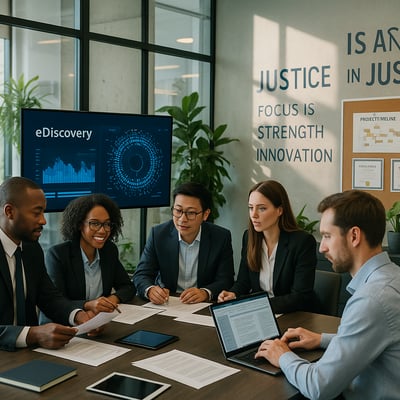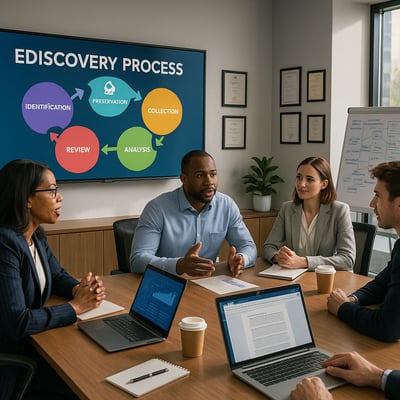" Cut Through the Digital Clutter: Why eDiscovery Is No Longer Optional \n In today’s legal...

Every week, the Array team reviews the latest news and analysis about the evolving field of eDiscovery to bring you the topics and trends you need to know. This week’s blog covers the week of February 12-18. Here’s what’s happening.
The Hon. Ralph Artigliere (ret.) wrote on the EDRM Blog about the distinction between Generative AI and search engines, and the need to craft AI prompts differently than one would enter text into a Google search, for example.
Understanding the large language model (LLM) will help you craft the right prompts. Artigliere referenced a Casetext article that outlines how LLMs, like ChatGPT-4 work. Some of Artigliere’s tips:
Array has its own generative AI tool, eDiscovery AI, that allows users to provide simple instructions via a prompt to a pre-trained large language model, streamlining the identification, classification, and summarization of data for review.
The ACEDS Blog covered a discovery decision in which the failure to produce a privilege log resulted in the loss of privilege and sanctions. The case involved claims under the Fair Labor Standards Act and New York labor laws made by a plaintiff who alleged she was not paid overtime while working at a law firm and was fired after she requested overtime payment. The firm argued the plaintiff was an exempt employee and acted in good faith.
The plaintiff filed a motion for sanctions after the firm didn’t completely produce audio files from WhatsApp, an instant messaging platform, that the plaintiff alleged could affect the law firm’s good faith defense. The firm withheld messages on privilege grounds, but didn’t provide a log, and withheld messages on relevance grounds past the court’s deadline.
The result for the defendant was that the court ruled it had waived privilege on the remaining files by failing to produce a log, and the court precluded the defendant from using previously undisclosed files to support its good faith defense.
When withholding documents based on privilege or other reservation, ensure that a log of withheld documents is promptly supplied and details the reason for withholding so as not to make the same mistake.
The Federal Trade Commission and Department of Justice recently announced updated language in their standard preservation letters to address the increased use of collaboration tools and ephemeral messaging platforms such as Slack, Microsoft Teams, and Signal. The changes are a reminder to check that your data retention settings for collaboration apps and ephemeral messaging tools follow best practices, and to proactively examine options for expert eDiscovery expertise and tools to export and sift through data — litigation at some point tends to be an inevitability.
“These updates to our legal process will ensure that neither opposing counsel nor their clients can feign ignorance when their clients or companies choose to conduct business through ephemeral messages,” said Manish Kumar, Deputy Assistant Attorney General of the Justice Department’s Antitrust Division. “The Antitrust Division and the Federal Trade Commission expect that opposing counsel will preserve and produce any and all responsive documents, including data from ephemeral messaging applications designed to hide evidence. Failure to produce such documents may result in obstruction of justice charges.”
Other recent eDiscovery news and headlines:

" Cut Through the Digital Clutter: Why eDiscovery Is No Longer Optional \n In today’s legal...



Every week, the Array team reviews the latest news and analysis about the evolving field of...